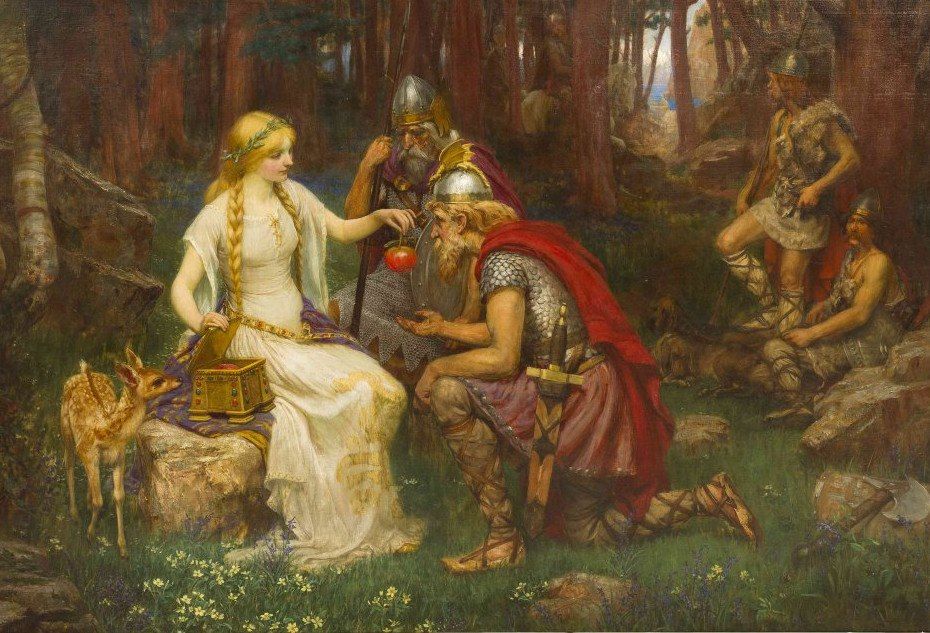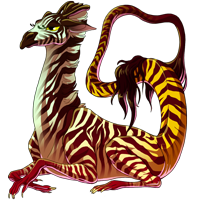

Idunn
(#68479283)
the gods' truest friend, maiden who knows eternal life
Click or tap to view this dragon in Predict Morphology.
Energy: 41/50

Expand the dragon details section.
Collapse the dragon details section.
Personal Style

Ancient dragons cannot wear apparel.
Skin
Scene

Measurements
Length
0.73 m
Wingspan
0.79 m
Weight
0.72 kg
Genetics
Gold
Sphinxmoth (Veilspun)
Sphinxmoth (Veilspun)
Buttercup
Hawkmoth (Veilspun)
Hawkmoth (Veilspun)
Metals
Branches (Veilspun)
Branches (Veilspun)
Hatchday
Breed
Eye Type
Level 1 Veilspun
EXP: 0 / 245


STR
5
AGI
6
DEF
5
QCK
8
INT
8
VIT
5
MND
8
Biography

[ Idun and the Apples by James Doyle Penrose, 1890 ]
Iðunn
Ithunn, Idunn, Ydun, Iduna
ever young, rejuvenator, the gods' lady, Æsir's age old cure
Iðunn is a Norse goddess associated with apples and youth attested in the Poetic Edda, compiled in the 13th century from earlier traditional sources, and the Prose Edda, written in the 13th century by Snorri Sturluson. She is described as the wife of the skaldic god Bragi and as a keeper of apples and granter of eternal youthfulness. A number of theories surround Iðunn, including potential links to fertility, and her potential origin in Proto-Indo-European religion. She is probably to be understood as an aspect of Freyja, a goddess whom the gods rely on for their youth and beauty. Long the subject of artworks, Iðunn is sometimes referenced in modern popular culture.
The name Iðunn has been variously explained as meaning "ever young", "rejuvenator", or "the rejuvenating one". As the modern English alphabet lacks the eth (ð) character, Iðunn is sometimes anglicized as Idhunn, Idunn, Idun, or Ithun. An -a suffix is sometimes appended to denote femininity, resulting in forms such as Iduna and Idunna. Other means of referring to Iðunn include "wife of Bragi", "keeper of the apples" and "the Æsir's age old cure". Additionally, in connection to the story of her abduction by Þjazi, she may be referred to as "Þjazi's booty". Within the cited portions of Haustlöng, Iðunn is referred to as "the maid who knew the Æsir's old age cure", "the gods' lady", "ale-Gefn", "the Æsir's girl-friend", and once by name. Scholars theorize that the possible etymological meaning of Iðunn—"ever young"—would potentially allow Iðunn to perform her ability to provide eternal youthfulness to the gods without her apples, and further state that Haustlöng does not mention apples but rather refers to Iðunn as the "maiden who understood the eternal life of the Æsir."
Iðunn is first introduced as Bragi's wife in the prose introduction to the poem Lokasenna, where the two attend a feast held by Ægir. In this exchange, Loki insults Bragi and accuses Iðunn of having slept with the killer of her brother (implied but never directly stated to be Bragi). It is likely that Lokasenna was intended to be humorous and that the accusations thrown by Loki in the poem are not necessarily to be taken as "generally accepted lore" at the time it was composed. Rather they are charges that are easy for Loki to make and difficult for his targets to disprove, or which they do not care to refute
In the poem Hrafnagaldr Óðins, Iðunn is identified as descending from elves, as the youngest of "Ivaldi's elder children" and as a dís or spirit who dwells in mountain valleys. In a passage of the 10th-century poem Haustlöng the skald Þjóðólfr of Hvinir gives a lengthy description of a richly detailed shield he has received that features a depiction of the abduction of Iðunn.
Iðunn is introduced in the Prose Edda Gylfaginning as Bragi's wife and keeper of an eski, or ashwood box used for carrying personal possessions, within which she keeps her immortal apples. The apples are bitten into by the gods when they begin to grow old and they then become young again, which is described as occurring up until Ragnarök. Gangleri, or King Gylfi in disguise, states that it seems to him that the gods depend greatly upon Iðunn's good faith and care. With a laugh, High responds that misfortune once came close, that he could tell Gangleri about it, but first he must hear the names of more of the Æsir, and he continues providing information about gods.
In the book Skáldskaparmál, Idunn is mentioned as one of eight ásynjur (goddesses) sitting in their thrones at a banquet in Asgard for Ægir. Bragi tells Ægir about Iðunn's abduction by the jötunn Þjazi. Bragi says that after hitting an eagle (Þjazi in disguise) with a pole, Loki finds himself stuck to the bird. Loki is pulled further and further into the sky, his feet banging against stones, gravel, and trees until, fearful that his arms will be pulled from their sockets, he roars for mercy, begging the eagle to set him free, to which the eagle agrees, but only on condition that Loki makes a solemn vow to lure Iðunn, bearing her apples of youth, from the safety of Asgard. Loki accepts Þjazi's conditions and returns to his friends Odin and Hœnir. At the time agreed upon by Loki and Þjazi, Loki lures Iðunn out of Asgard into "a certain forest", telling her that he has discovered some apples that she would find worth keeping, and furthermore that she should bring her own apples with her so that she may compare them with the apples he has discovered. Þjazi arrives in eagle shape, snatches Iðunn, flies away with her and takes her to his home, Þrymheimr.
The Æsir begin to grow grey and old at the disappearance of Idunn. The Æsir assemble at a thing where they ask one another when Iðunn had been seen last. The Æsir realize that the last time that Iðunn was seen was when she was going outside of Asgard with Loki, and so they have Loki arrested and brought to the thing. Loki is threatened with death and torture. Terrified, Loki says that if the goddess Freyja will lend him her "falcon shape" he will search for Iðunn in the land of Jötunheimr. Freyja lends the falcon shape to Loki, and with it, he flies north to Jötunheimr. One day later, Loki arrives at Þjazi's home. There he discovers that Þjazi is out at sea in a boat, having left Iðunn at home alone. Loki transforms the goddess into a nut, grasps her in his claws, and flies away with her as fast as possible.
Þjazi, arriving home to discover Iðunn gone, resumes his eagle shape and flies off in pursuit of Loki, his mighty wings stirring up a storm as he does so. The Æsir, seeing a falcon flying with a nut clutched in its claws and hotly pursued by an eagle, make haste to pile up a great heap of wood shavings and set it alight. The falcon flies over the battlements of Asgard and drops down behind the wall. The eagle, however, overshoots the falcon and, unable to stop, plunges through the fire, setting light to his feathers and falling to the ground within the gates of Asgard, whereat the Æsir set upon the jötunn and kill him, leading the narrator to comment "and this killing is greatly renowned." Iðunn's abduction is one of the most dangerous moments for the gods, as the general patrilocal movement of female jötnar to the gods would be reversed.
Academics theorize Iðunn's abduction by Thjazi in eagle form as an example of the Indo-European motif "of an eagle who steals the celestial means of immortality." Additionally, a parallel to the theft of Iðunn's apples (symbols of fertility) has been noted in the Celtic myth where Brian, Iuchar, and Icharba, the sons of Tuirenn, assume the guise of hawks in order to steal sacred apples from the garden of Hisberna. Here, too, there is pursuit, the guardians being female griffins.
Many surviving stories regarding Iðunn focus on her youth-maintaining apples, which scholars link to religious practices in Germanic paganism. Buckets of apples were found in the 9th-century Oseberg ship burial site in Norway and that fruit and nuts (Iðunn having been described as being transformed into a nut in Skáldskaparmál) have been found in the early graves of the Germanic peoples in England and elsewhere on the continent of Europe which may have had a symbolic meaning and also that nuts are still a recognized symbol of fertility in Southwest England. Others note a connection between apples and the Vanir, a group of gods associated with fertility in Norse mythology, citing an instance of eleven "golden apples" being given to woo the beautiful Gerðr by Skírnir, who was acting as a messenger for the major Vanir god Freyr in the Skírnismál. There also exists a further connection between fertility and apples in Norse mythology: in the Völsunga saga when the major goddess Frigg sends King Rerir an apple after he prays to Odin for a child, Frigg's messenger (in the guise of a crow) drops the apple in his lap as he sits atop a mound. Rerir's wife's consumption of the apple results in a six-year pregnancy and the caesarean section birth of their son—the hero Völsung.
The phrase "apples of Hel" used in an 11th-century poem by the skald Þórbjörn Brúnason may also imply that the apple was thought of by the skald as the food of the dead. The potentially Germanic goddess Nehalennia is sometimes depicted with apples and parallels exist in early Irish stories. The figure of Iðunn is likely rooted in the legacy of an ancient goddess of life-giving fruit of the other world.
Click or tap a food type to individually feed this dragon only. The other dragons in your lair will not have their energy replenished.
Feed this dragon Insects.
Feed this dragon Meat.
Feed this dragon Seafood.
Feed this dragon Plants.
Exalting Idunn to the service of the Lightweaver will remove them from your lair forever. They will leave behind a small sum of riches that they have accumulated. This action is irreversible.
Do you wish to continue?
- Names must be longer than 2 characters.
- Names must be no longer than 16 characters.
- Names can only contain letters.
- Names must be no longer than 16 characters.
- Names can only contain letters.











